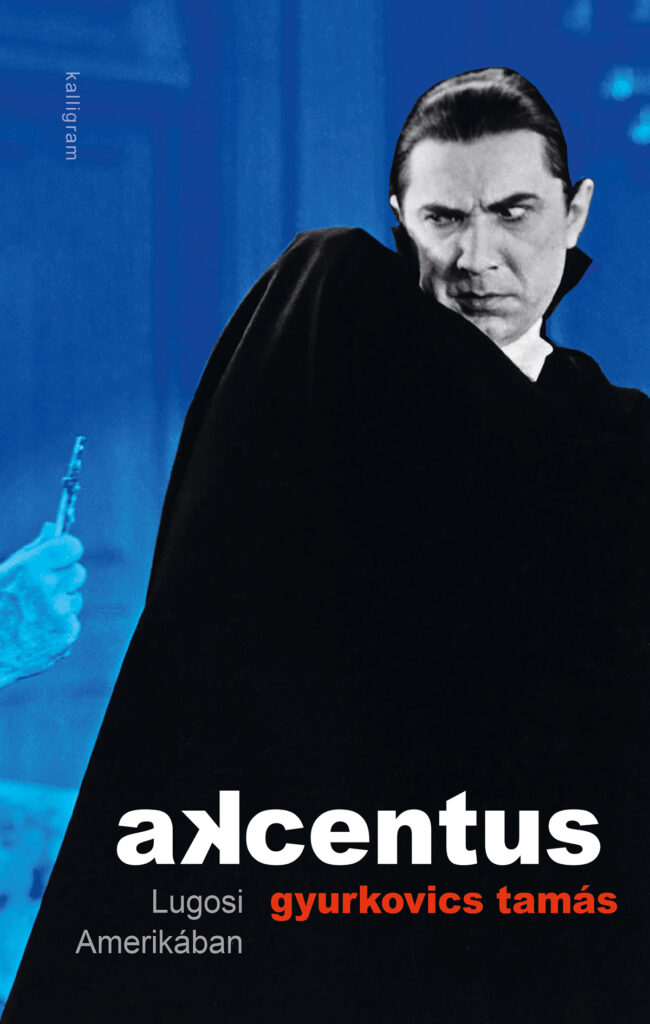
Author: Tamás Gyurkovics
Original title: Akcentus – Lugosi Béla Amerikában
Title in English: The Accent – Béla Lugosi in America
Year of publication: 2022
Publisher: Kalligram
Number of pages: 439
Tamás Gyurkovics’s The Accent is a biography unlike any other. In fact, to label it biography is already somewhat misleading. Instead, consider it a historical story of unrequited love steeped in the rich tradition of Hungarian autofiction. Where traditional biographies say, “No recording survives of this interview,” or “we don’t know exactly what was said in the meeting with these film executives,” Gyurkovics says, “Here’s how it could have happened.”
In short, The Accent tells the story of famed Dracula actor Bela Lugosi’s (or Lugosi Béla in Hungarian) life in America. All the highlights (and lowlights, more often than not) of his absurd and tragic life are present: his rise to stardom in the role of Dracula, his fraught relationship with fellow horror actor Boris Karloff and the role of Frankenstein, the years spent working himself to the bone touring for the theater in England, his drug abuse, life of excess (in drink, smoke, wives, and finances), hospitalization, potential if ultimately unrealized triumphant return, and death. In addition to the specifics of Lugosi’s life, the backdrop of the book is incredibly rich. We get more than a glimpse into the day’s film industry and Hollywood of the first half of the 20 th century, Lugosi’s connection with low-grade B movies and their shining hero, Ed Wood, who features quite prominently throughout the book, and even the strong presence of Hungarian theater in New York in the 1920s when Lugosi arrives in America. As for the aforementioned unrequited love, that thread comes in the form of Zazi (or Zoltán), our narrator, who is in love with Lugosi, utterly devoted to him, and whose private life – the only purely fictional element of the entire book – is expertly woven throughout the text. Most often it intersects with Lugosi’s life, but even in the sections where the two threads diverge, Zazi’s longing and repressed love for his friend and employer carry the text so admirably that even those who only pick this book up because they’re a rabid Lugosi fan will not be disappointed.
The true elements of Lugosi’s life and the setting of the 20 th century film industry mentioned above are well documented elsewhere, but there are several elements of The Accent which make it stand out and stand above other Lugosi “biographies.” One such element, and the most obvious, is the text’s narrator: Zoltán (nickname Zazi), an invented character who is ever-present in Lugosi’s life. Secretary, agent, friend, and confidant, Zazi is a gay man who is hopelessly in love with Lugosi. But more important than Zazi’s role in the plot are the roles he represents for the reader.
He is Lugosi’s subconscious. Lugosi is a hopeless optimist, campy not just in many of his film roles but in life as well. He spends beyond his means, squanders opportunities, but always forges on under the assumption the next big role is just around the corner. In many ways, he is like a gambling addict seeking his big payout, against the odds and to his own detriment. Zazi sees this, understands it deeply, and despite his best efforts to guide Lugosi down the right path, ultimately has to sit by helplessly as the object of his affection succumbs to his vices. Many of the conversations between the two could just as easily be the rational and irrational sides of Lugosi striving for supremacy, with the irrational side most often winning out.
He is Lugosi’s desire to be loved. Lugosi has no stronger desire than to be loved and adored by his audience, just as Zazi’s ultimate desire is to be loved by Lugosi. Yet deep down, both of them know this love is difficult, if not impossible, to come by. Just as Lugosi soldiers on in the face of rejection, exploitation, and humiliation, Zazi too sticks by his side, knowing, if not admitting to himself, that the journey he is on is doomed to failure. While there is a love of sorts between the two (as there is between Lugosi and is fans), it is never the full-blown adoration that either party craves.
He is Lugosi’s adoring audience. Fans of Bela Lugosi know all too well the (often self-inflicted) tragedies of Lugosi’s life, and yet still we hope for his redemption, resurrection, and recognition. Zazi is desperate in his desire to see Lugosi succeed, but is ultimately unable to help him, much like the actor’s adoring fans, looking on sadly as the actor fumbles irresponsibly through his life. To be Zazi, or a Lugosi fan, is to look on someone you love with sadness, regret, and a hope we know will never be realized.
As an actor, Lugosi is known for his over-the-top, campy, theatrical performances in his primarily black-and-white horror films. And in many ways, the style of narration turns the book itself into an over-the-top, exaggerated, melodramatic retelling of Lugosi’s life – it often borders on prose-poetry, but is always entirely readable. This is largely due to the aforementioned roles that Zazi plays – the way he talks about Lugosi, the way he expresses his hope and dejection for the actor, could easily be a black-and-white mid-20 th century drama all on its own.
And lastly, in breaking with typical biographical tradition, The Accent moves backward in time. The novel’s first section begins with Lugosi having just been released from the hospital after being treated for addiction, and by page 37, in 1956, he is dead. We then move into the next section, detailing his growing addiction resulting from an old war wound and unrelenting theater touring, under the backdrop of the anti-communist Red Scare which, owing to Lugosi’s political activity and unionization efforts in Hungary, only causes further problems.
And eventually, we reach Lugosi’s starring role in Dracula, 1931. By working through Lugosi’s life in reverse, Gyurkovics successfully saves the highlight of the actor’s career as a climax the book has been alluding to and working toward from page one. This also adds to the depth of sadness and desperation, even despair, throughout the novel – we know Lugosi finds success with Dracula, but before we see that success, we see what it leads to, and the fate that awaits the doomed actor.
Excerpt in English available
